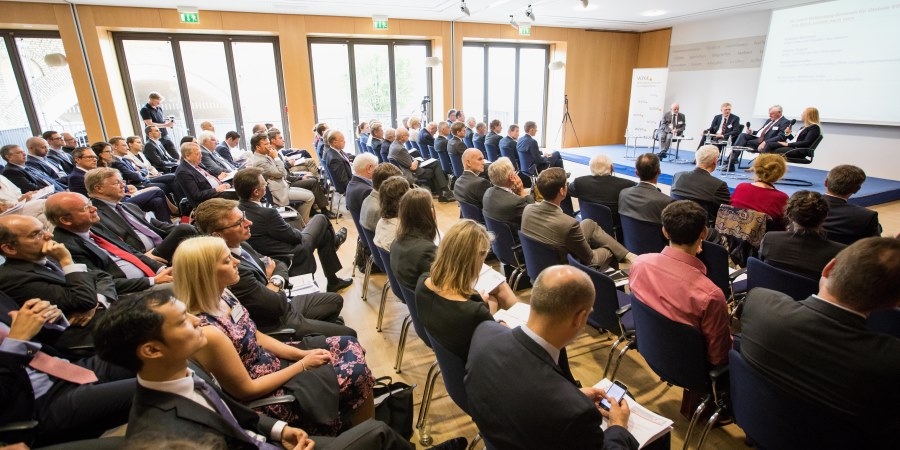More than 200 supporters and partners discussed global business ethics, the challenges of digitalization and good leadership in Berlin
The Wittenberg Center for Global Ethics (WCGE) had invited the state representation of Saxony-Anhalt to the Symposium in Berlin, on the occasion of its 20th anniversary on June 15, 2018. Within his welcome speech Dr. Martin von Broock established a connection between the ambitious goals of the founding fathers and the present significance of the WCGE, mentioning the increasing importance of ethics. In times of growing uncertainty, trusting cooperation becomes increasingly relevant, but is also associated with more conditions.
Dr. Michael Schneider, State Secretary for Federal and European affairs, was pleased with a “full house” and sent some congratulations on behalf of the state government of Saxony-Anhalt to the 20th anniversary of the WCGE. In doing so, he mentioned the many “important impulses” that came from the WCGE in the last few years and were emitted into the world.
The diversity of the WCGE program was also reflected in the auditorium: In addition to many personal members of the center, there were numerous representatives from the member companies, including some board and supervisory board members, sponsors from foundations, alumni of the management colloquium, scholarship holders from the doctoral college and numerous others Partners from politics, science, trade unions, NGOs and churches.
Within the first panel, Eckhard Naumann, co-founder and president of the association WCGE, Dietmar Kokott, deputy chairman of the foundation board, and Sabine Wiesmüller, who is currently conducting research in the doctoral program “Ethics and Good Leadership,” cast a glance back to the WCGE’s past. Under the moderation of Waldemar Hötte, they recreated the eventful history of the center.
The second Panel was opened by Prof. Karl Homann, chairman of the foundation board, with a discussion on “Global ethics – How is business supposed to and is it possible to promote the well-being of the people?” Astrid Messmer, Senior Director of the German Lufthansa AG, and Dr. Ing. Ralph Reinboldt, member of the European board of Fuchs Petrolub SE, contributed examples from business practice in the discussion moderated by Prof. Philipp Schreck.
Prof. Wolfgang Huber, Member of the Board of Trustees, kicked off the third panel with a talk on "Digital Transformation: (Where) Do we have to set or overcome limits?" Dr. Herbert Jakoby from the ministry of economics, innovation, digitalization and energy NRW, as well as Prof. Burkhard Schwenker, Roland Berger GmbH and member of the presidium under the chairmanship of Dr. Martin von Broock then supplemented political and economic perspectives on the topic.
After lunch break, in which the scholarship holders of the Doctoral School "Ethics and Good Management" presented their research projects in a poster session, the last panel followed: First, Prof. Andreas Suchanek introduced for the first time the "Ethical Compass for Good Leadership", which the WCGE developed in a dialogue process with more than 500 national and international managers and junior staff in the year of Reformation. Comments were given by Michael Heinz, Member of the Board of BASF SE and member of the Board of trustees, and Alexander Noßmann, HHL PhD student at HHL; Boston Consulting Group. The subsequent discussion was moderated by Dr. Lisa Schmalzried.
In all panels there was a lot of public participation, and as expected, not all of the numerous questions could be answered. Nevertheless, all contributions gave the WCGE valuable food for thought - for the next 20 years and beyond.

